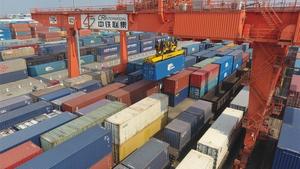 A men eats at a restaurant in Tianxin District of Changsha, central China's Hunan Province, Feb 19, 2020. (CHEN ZEGUO / XINHUA)
A men eats at a restaurant in Tianxin District of Changsha, central China's Hunan Province, Feb 19, 2020. (CHEN ZEGUO / XINHUA)
BEIJING - China's consumer market is likely to stabilize and bottom out by March as the influence of the outbreak of novel coronavirus disease (COVID-19) fades away, an official with the Ministry of Commerce (MOC) said Thursday.
The epidemic, which broke out in late January, would not affect long-term stability and continued upgrade of China's consumer market, Wang Bin with the Ministry of Commerce told an online press conference, who expected its market impact to peak in February.
ALSO READ: Moves to help export firms ramp up work
Wang estimated that while consumption in the first quarter would be the most heavily affected, the market would recover in the second quarter and further improve in the latter half of the year
Wang estimated that while consumption in the first quarter would be the most heavily affected, the market would recover in the second quarter and further improve in the latter half of the year over a compensatory rebound in consumption activities.
Catering service, hospitality, tourism, as well as cultural and entertainment sectors, are the worst-hit in the epidemic, while in terms of consumer goods, sales of automobiles, home appliances, jewelry and apparel are likely to suffer more, he said.
Wang said priority has been given to orderly resumption of production and daily life activities while keeping up epidemic control and prevention efforts, adding that the ministry has made arrangements to push for reopening of businesses and support enterprises to pull through.
Policies to support foreign trade in the pipeline
The MOC also said that measures will be taken to stabilize foreign trade, amid the country's efforts to mitigate the economic impact of the epidemic.
The epidemic will only have a temporary impact on supply chains, and the country's foreign trade firms were speeding up the resumption of production, Li Xingqian, an official at the Ministry of Commerce, told a news briefing.
Some 70 percent of major foreign trade firms in provinces of Zhejiang and Shandong have resumed operations, while for those in Guangdong and Jiangsu, also the country's manufacturing hubs, resumption of production was also accelerating, according to Li.
 Aerial photo taken on Feb 19, 2020 shows a view of the Chengdu International Railway Port in Chengdu, capital of southwest China's Sichuan Province. (LIU KUN / XINHUA)
Aerial photo taken on Feb 19, 2020 shows a view of the Chengdu International Railway Port in Chengdu, capital of southwest China's Sichuan Province. (LIU KUN / XINHUA)
Besides existing policies to help companies address a lack of workers, raw materials and epidemic-prevention supplies as well as logistics problems, the country will unveil more policies to stabilize foreign trade, Li said without providing details about the policies.
Li said the country is enhancing efforts to control the epidemic while increasing support for foreign trade companies.
The epidemic has killed more than 2,100 people on the Chinese mainland, with total infections reaching 74,576 by the end of Wednesday.
However, daily new confirmed cases of the disease outside Hubei, the center of the epidemic, have dropped for 16 consecutive days.
Satbilizing automobiles consumption
The country will also roll out more policies to stabilize the consumption of automobiles, according to an official with the MOC.
China sold a total of 1.94 million vehicles in January, down 18 percent year on year, according to the China Association of Automobile Manufacturers (CAAM).
Last month, new energy vehicle sales slumped 54.4 percent, while production dropped by 55.4 percent year on year, said the CAAM.
READ MORE: Experts: China's economy still on even keel
"Since last year, the automobile industry has been in a period of adjustment," said the MOC official, who attributed the sales fall to the delayed consumption demand due to the early Spring Festival holiday and the outbreak of the epidemic.
All localities are encouraged to beef up efforts to promote the consumption of new energy vehicles, lift vehicle purchase restrictions and carry out automobile replacement, said the ministry.


